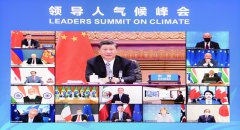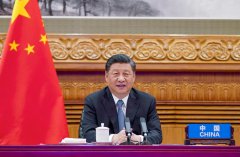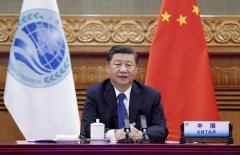German leader champions new tack on climate at Davos event
New German Chancellor Olaf Scholz has called for a “paradigm shift” in the way the world approaches climate policy, saying his country would leverage its presidency of the Group of Seven industrial nations to push for standards to fight global warming
January 19, 2022, 9:01 PM
5 min read
Share to FacebookShare to TwitterEmail this articleGerman Chancellor Olaf Scholz sits in front of a camera as he delivers his speech for the Davos Agenda 2022, at the chancellery in Berlin, Germany, Wednesday, Jan. 19, 2022. The Davos Agenda, which takes place from Jan. 17 to Jan. 21, 2022, is an online edition of the annual Davos meeting of the World Economy Forum due to the coronavirus pandemic. (AP Photo/Markus Schreiber, Pool)
GENEVA -- New German Chancellor Olaf Scholz called Wednesday for a “paradigm shift” in the way the world approaches climate policy, saying his country would leverage its presidency of the Group of Seven industrial nations this year to push for standards to fight global warming.
Climate discussions have been a key theme this week at a World Economic Forum meeting, which is being held online after COVID-19 concerns delayed its annual gathering in Davos, Switzerland. It included a panel with U.S. special envoy on climate John Kerry and billionaire Bill Gates that featured ideas environmentalists and scientists have challenged: that innovations yet to be invented or used widely would help drastically reduce emissions.
Unlike events such as last year's U.N. climate conference in Glasgow, Scotland, the Davos meeting is more of a discussion of big ideas — not where concrete agreements are made on how to act. Critics regularly fault the Davos event, whose origins date to 1971, for hosting economic and political elites who voice high-minded but often empty goals that are deemed out of touch with the needs of regular people.
In an address, Scholz focused on ambitions by Germany and the wider European Union to fight climate change.
“Europe has decided to become the first carbon-neutral continent by 2050; Germany wants to reach that goal in 2045 already … a monumental task, but a task that we can and will master,” he said.
Scholz added that Germany will use its G-7 presidency to “turn that group into the nucleus of an international climate club."
“What we want to achieve is a paradigm shift in international climate policy. We will no longer wait for the slowest and least ambitious," he said. “Instead, we will lead by example, and we will turn climate action from a cost factor into competitive advantage by agreeing on joint minimum standards.”
Scholz said the “climate club,” which he first announced months ago when he was finance minister, would be open to all countries.
Several groups of countries have similar goals, including the High Ambition Coalition that aims to achieve the strictest target in the Paris climate accord — limiting global warming to 1.5 degrees Celsius (2.7 Fahrenheit) by the end of the century compared with pre-industrial times.
Critics say such groups often include members with less-than-stellar climate records. Both Germany and the United States, for example, are not on track to meet their emission reduction goals and have pushed back against granting poor countries the kind of funding they seek to tackle climate change.
The targets Scholz suggested for the climate club — the 1.5-degree cap and climate neutrality by 2050 — are already part of or implied by the Paris accord. More significant, Scholz said the club could seek to achieve those goals “by pricing carbon and preventing carbon leakage.”
Those proposals are designed to prevent companies from shifting carbon-heavy industries to countries with less stringent emissions rules and putting nations like Germany at a competitive disadvantage.
While the idea has strong support within the European Union, whose members are used to negotiating compromise agreements for the common good, getting the U.S. and major developing countries such as China and India on board will be trickier.










